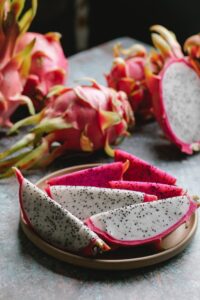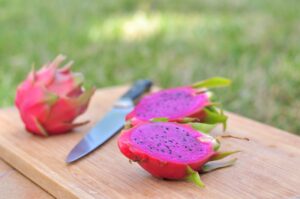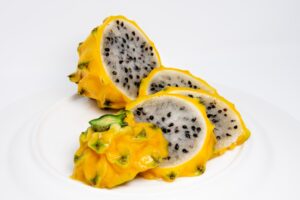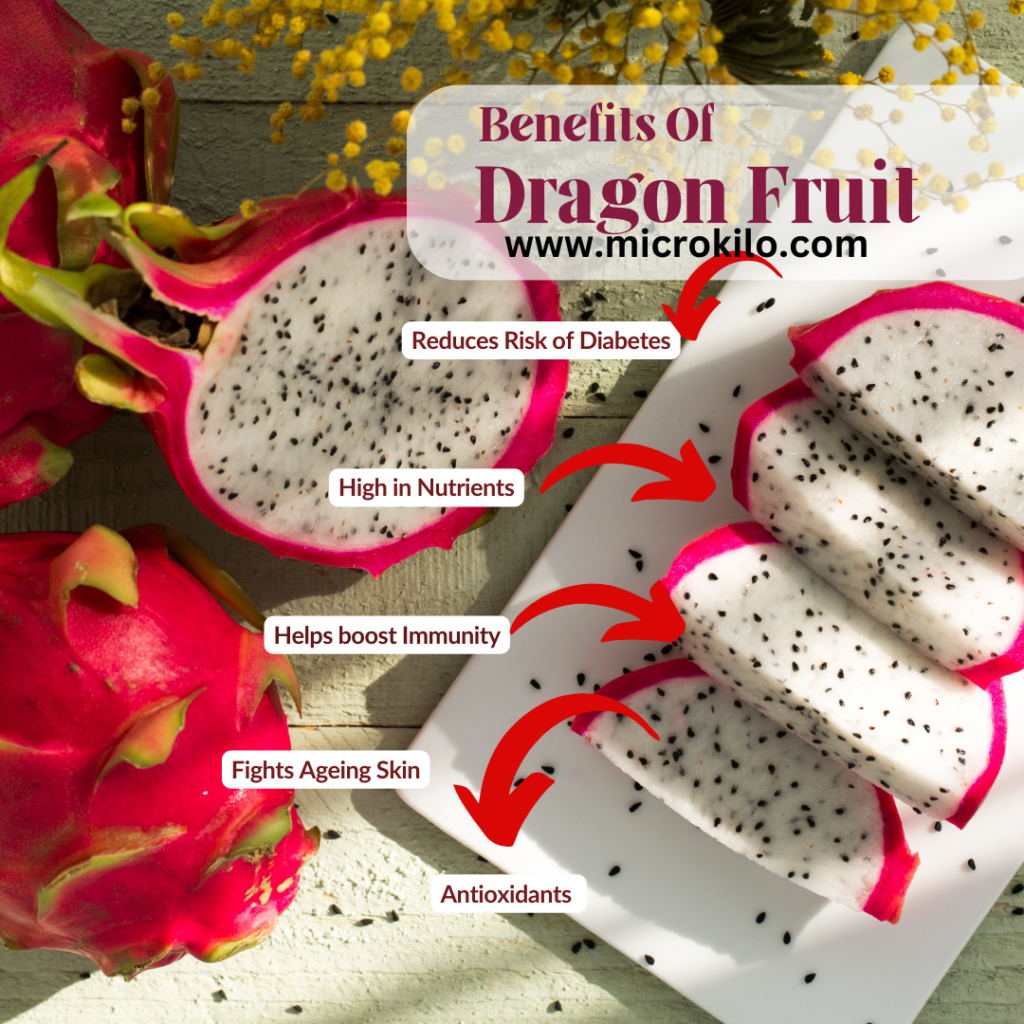If you’re looking to embark on a rewarding journey of cultivating your very own Dragon Fruit plant, you’ve come to the right place. This guide will walk you through the ins and outs of nurturing these fascinating and exotic plants. From understanding their unique needs to enjoying the bountiful harvest, let’s dive into the enchanting world of the Dragon Fruit plant.
This article will delve into the captivating world of dragon fruit, exploring its varieties, cultivation, care, and culinary uses.

Getting Acquainted with the Dragon fruit Plant
The Dragon Fruit plant, belongs to the cactus family and is renowned for its stunning, brightly colored fruits. These fruits come in various types, including red, yellow, and white, with the flesh speckled with tiny black seeds. Known for its sweet and refreshing taste, Dragon Fruit has gained popularity worldwide.
Varieties of Dragon Fruit
There are three primary varieties of dragon fruit, each with its unique characteristics:
White-Fleshed Dragon Fruit

The white-fleshed dragon fruit, is recognized by its bright pink or yellow skin and white, sweet flesh. It is the most commonly found variety in the market and is a favorite among fruit enthusiasts.
Red-Fleshed Dragon Fruit

The red-fleshed dragon fruit, is recognized by its red or magenta flesh, which is slightly sweeter than the white-fleshed variety. Its outer skin is typically red or pink, making it a striking addition to any fruit basket.
Yellow Dragon Fruit

The yellow dragon fruit, is characterized by its bright yellow skin and sweet, tangy flavor. This variety offers a refreshing twist on the traditional dragon fruit experience.
Growing Conditions
To successfully cultivate dragon fruit, it’s crucial to understand the ideal growing conditions. Here are some key factors to consider:
Climate and Location
Dragon fruit plants thrive in tropical and subtropical climates. They require temperatures between 18°C to 38°C for optimal growth.
Soil Requirements
Well-draining soil is essential for dragon fruit plants. A mixture of sandy and loamy soil with a slightly acidic to neutral pH level is ideal. It’s essential to ensure proper drainage to prevent waterlogging, which can harm the plant’s roots.
Sunlight and Water
Dragon fruit plants require plenty of sunlight to grow and produce fruit. They thrive in full sun conditions but can tolerate partial shade. Watering should be consistent but not excessive, as overwatering can lead to root rot.
Cultivation Methods
Dragon fruit can be cultivated using various methods, including:
From Seeds
Growing dragon fruit from seeds is possible, but it’s a slower process. It’s essential to select high-quality seeds and provide a warm, moist environment for germination.
Cuttings
Using cuttings from a mature dragon fruit plant is a popular and efficient propagation method. Select healthy stem segments and allow them to root before transplanting.
Grafting
Grafting dragon fruit onto another compatible cactus species can also yield excellent results. This method can be used to combine desirable traits from different varieties
Harvesting the Sweet Rewards
After months of hard work and nurturing, it’s time to reap the delicious rewards. Harvest your Dragon Fruit when it’s ripe. The fruit should yield slightly to gentle pressure when it’s ready to be picked.
Enjoy the sweet, juicy flesh straight from the fruit, or add it into smoothies, salads, and desserts. Dragon Fruit is not only a treat for your taste buds but also a nutritious addition to your diet.
Nutritional Benefits of Dragon Fruit
Dragon fruit is not only visually appealing but also packed with nutritional benefits. It is rich in antioxidants, vitamin C, fiber, and essential minerals, making it a healthy addition to your diet.

Dragon fruit is a versatile ingredient that can be enjoyed in various culinary creations. From smoothie bowls to exotic fruit salads, its vibrant colors and sweet flavor add a unique twist to any dish.
Popular Dragon Fruit Recipes
- Dragon Fruit Smoothie Bowl: Blend dragon fruit with yogurt and your favorite fruits for a refreshing and colorful breakfast.
- Dragon Fruit Salsa: Dice dragon fruit, tomatoes, onions, and cilantro, and season with lime juice for a tangy salsa.
- Dragon Fruit Sorbet: Create a delicious frozen dessert by blending dragon fruit with honey and freezing the mixture.
Conclusion
In conclusion, the dragon fruit plant is a tropical gem that offers not only stunning aesthetics but also delectable flavors and numerous health benefits. By understanding its growth requirements, propagation methods, and culinary versatility, you can enjoy this exotic fruit right in your own garden.
2 thoughts on “Unveiling the Wonders of the Dragon Fruit Plant”